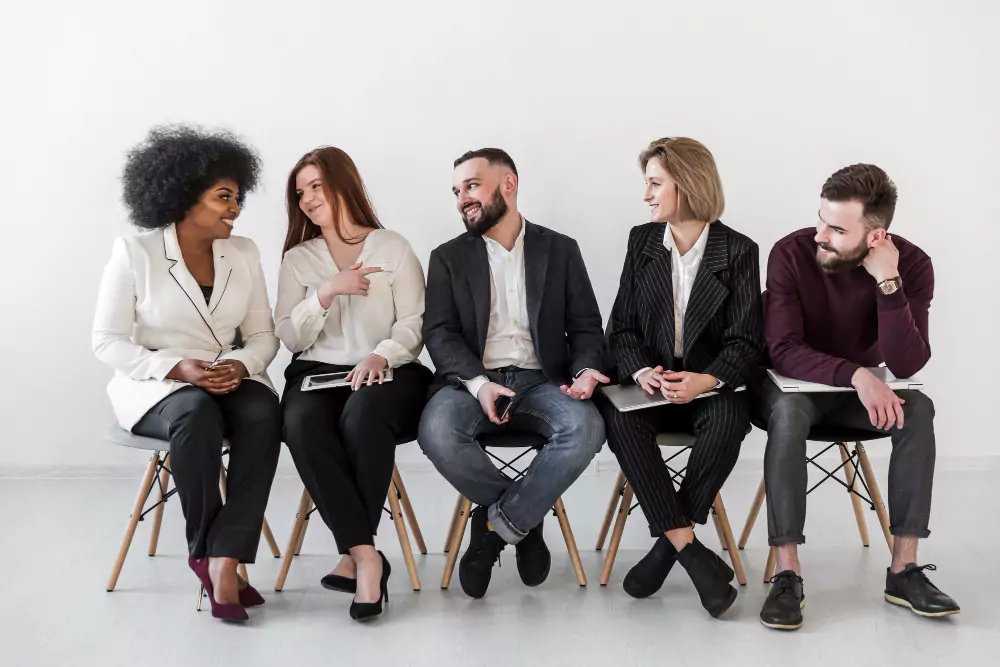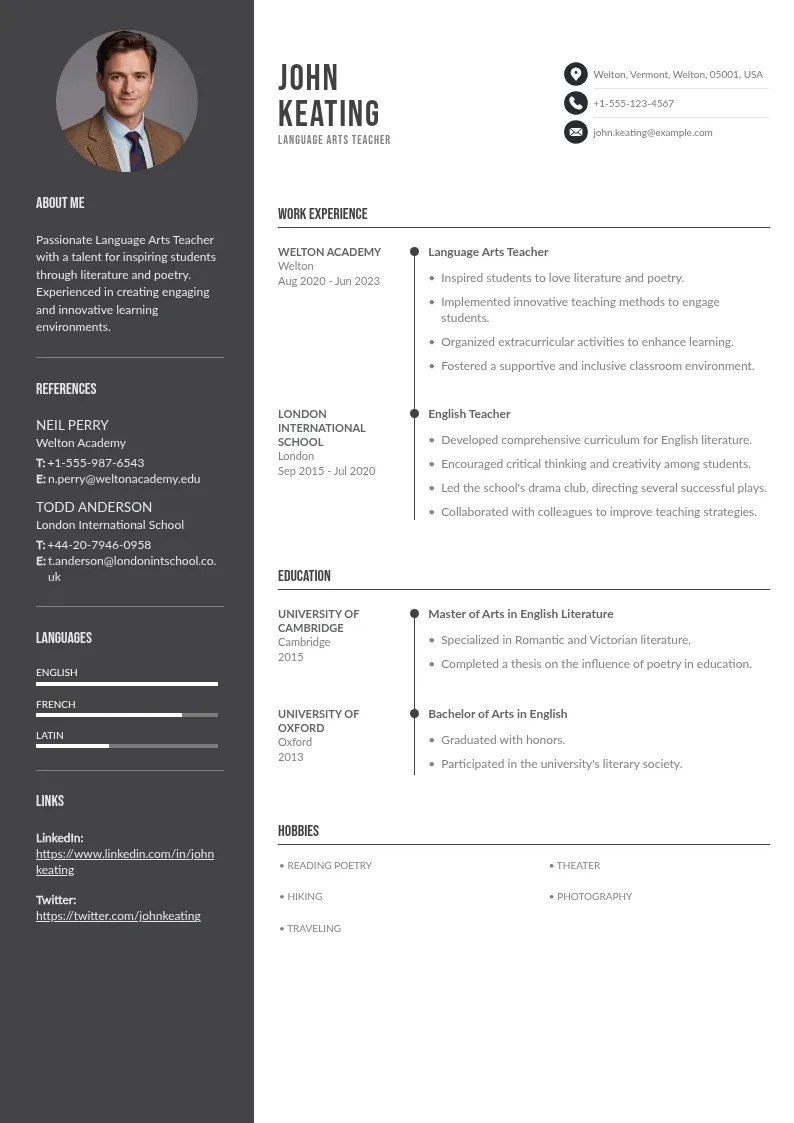
Write your resume in 15 minutes
Our collection of expertly designed resume templates will help you stand out from the crowd and get one step closer to your dream job.


This article explores how to prepare for a group interview, essential tips to succeed, and common questions you might face.
What is a Group Interview?
A group interview involves interviewing several candidates, usually for the same position or role. Unlike traditional one-on-one interviews, group interviews focus on observing how the panel interview candidates interact, solve problems, and demonstrate leadership.
Types of Group Interviews
1. Candidate Group Interview:
- Multiple candidates are interviewed at once by one or more interviewers.
- Focuses on evaluating teamwork, communication, and leadership through group discussions, role-playing, or problem-solving activities.
- Commonly used for sales, customer service, and retail roles.

2. Panel Group Interview
- One candidate is interviewed by multiple interviewers.
- Each interviewer may assess specific skills, such as technical expertise, cultural fit, or leadership.
- Commonly used for senior-level, technical, or high-stakes roles.
3. Discussion-Based Interview:
- Candidates work together to discuss or solve a problem.
- Evaluates skills like teamwork, critical thinking, negotiation, and decision-making.
- Commonly used for consulting, marketing, and management roles.
Why Do Companies Use Group Interviews?
Companies use group interviews to evaluate candidates in dynamic, real-world settings. This approach helps employers efficiently assess multiple applicants while observing their skills and behaviors. Common, sample group interview questions and reasons include:
- Efficient Screening: Saves time and resources by interviewing multiple candidates simultaneously.
- Leadership & Teamwork Assessment: Identifies natural leaders, effective collaborators, and influential communicators.
- Problem-Solving Evaluation: Allows employers to see how candidates approach and solve tasks under pressure.
- Communication & Interpersonal Skills: Reveals how well candidates articulate ideas, actively listen, and build rapport.
- Cultural Fit Assessment: Helps identify candidates whose personalities and working styles align with the company’s values.
- Handling Competitive Environments: Tests how candidates react to competition and remain composed under stress.
- Observation of Non-Verbal Cues: Allows interviewers to assess body language, confidence, and engagement.
- Realistic Job Simulation: Provides insight into how candidates perform in scenarios relevant to the role.
- Comparison of Candidates: Facilitates direct comparison between applicants, making it easier to identify standout performers.
- Adaptability Measurement: Evaluates how well candidates adjust to changing dynamics and respond to unexpected challenges.
Industries like retail, hospitality, and customer service often use group interviews to simulate real-world scenarios.
How to Prepare for a Group Interview?
1. Research the Company and Role:
- Understand the company’s values, mission, products, services, and work culture.
- Study the job description carefully to identify the skills and qualities the employer is looking for.
- Prepare to explain how your skills and experiences align with the company’s goals.

2. Practice Effective Communication:
- Work on active listening and articulating your thoughts clearly and concisely.
- Avoid interrupting others; wait for appropriate moments to contribute.
- Acknowledge others’ ideas and build upon them to showcase teamwork.
- Make eye contact with both interviewers and fellow candidates when speaking.
3. Develop Leadership and Teamwork Skills:
- Demonstrate leadership by guiding discussions, when necessary, but don’t dominate.
- Show collaboration by encouraging quieter participants to share their thoughts.
- Maintain a positive and approachable demeanor throughout the interview.
- Be flexible and open-minded when working with others’ ideas.
4. Stay Calm Under Pressure:
- Practice deep breathing or visualization techniques to manage stress.
- Maintain focus and composure during fast-paced tasks.
- Break down problems into smaller, manageable parts to avoid feeling overwhelmed.
5. Prepare for Common Activities:
- Familiarize yourself with activities often used in group interviews, such as:
- Case studies or problem-solving exercises.
- Role-playing scenarios.
- Group discussions on a given topic.
- Presentation tasks or collaborative challenges.
- Practice these activities with friends or mentors to build confidence.
6. Showcase Your Unique Qualities:
- Differentiate yourself by emphasizing your unique skills and experiences.
- Highlight strengths that are relevant to the job, such as creativity, leadership, or analytical thinking.

7. Dress Appropriately:
- Choose attire that aligns with the company’s dress code.
- When in doubt, opt for business casual or formal wear.
8. Bring Necessary Materials:
- Carry multiple copies of your resume, a notepad, and a pen.
- Bring a portfolio if applicable to your role (e.g., design, writing, marketing).
9. Prepare Thoughtful Questions:
- Have a few insightful questions ready to ask the interviewers, demonstrating your interest and preparation. Consider asking about:
- Company culture
- Team structure
- Growth opportunities
- Success metrics
- Next steps in the process
10. Follow Up After the Interview:
- Send a thank-you email to the interviewers, expressing your appreciation for the opportunity.
- Mention something specific you enjoyed or learned during the group interview.
Common Group Interview Questions and How to Answer Them
In a group interview, employers often ask questions to assess various skills like communication, leadership, teamwork, problem-solving skills, problem-solving, and adaptability. Here are some common questions and how to answer them effectively:
1. Can you introduce yourself?
Sample Answer: In a group interview with the hiring manager, introduce yourself briefly but meaningfully.
2. How would you handle a disagreement within a team?
Sample Answer: Use the STAR method (Situation, Task, Action, Result) to structure your answer.
3. Describe a time when you took the lead in a project.
Sample Answer: Showcase your leadership abilities with a clear example.

4. How would you prioritize tasks in a fast-paced environment?
Sample Answer: Demonstrate your time management and adaptability skills.
5. What makes you a strong team player?
Sample Answer: Emphasize your collaboration skills and adaptability.
Tips to Succeed in a Group Interview
1. Make a Strong First Impression
Greet interviewers and fellow candidates warmly with a firm handshake and a friendly smile. Introduce yourself confidently, providing a summary of who you are and your interest in the role. Display enthusiasm and professionalism throughout the hiring process.
2. Be a Good Listener
Show respect for others' opinions by actively listening when others are speaking. Nod or acknowledge valid points made by others to demonstrate attentiveness. Avoid interrupting others and wait for the right moment to share your thoughts. Take notes if needed to remember key points made by job interview callers or fellow candidates.
3. Engage in Constructive Dialogue
Provide well-thought-out responses that are relevant to the discussion. Build on others’ ideas rather than dismissing them, showcasing collaboration skills. When disagreeing, do so respectfully and offer alternative suggestions from multiple positions or perspectives. Keep your tone positive and solution-oriented throughout the conversation.
4. Demonstrate Leadership
Take initiative when appropriate, such as volunteering to lead a discussion group setting, or summarizing group ideas. Encourage quieter participants to share their thoughts, displaying inclusivity and teamwork. Stay composed and focused during high-pressure moments, guiding the group toward effective outcomes. Be assertive but not overbearing, maintaining a balance between leadership and collaboration.
5. Stay Professional
Maintain a calm and confident demeanor, even if others become stressed or aggressive. Show respect to everyone in the room, including other candidates. Display patience and adaptability when faced with unexpected challenges or changes in the interview structure. Remain polite throughout the whole interview process, regardless of the dynamics.
6. Use Positive Body Language
Maintain eye contact with interviewers and fellow candidates when speaking and listening. Smile and keep a pleasant facial expression to convey openness and approachability. Sit up straight and avoid slouching to demonstrate interest and engagement. Use natural gestures to emphasize points but avoid excessive or distracting movements.

What to Avoid During a Group Interview
- Interrupting Others: Let others finish speaking before responding. Cutting someone off can seem rude and unprofessional.
- Dominating the Conversation: Speak up, but don’t take over. A group interview is about teamwork, so balance your participation.
- Negative Body Language: Avoid crossing your arms, slouching, or avoiding eye contact. Maintain an open posture and stay engaged.
- Lack of Preparation: Research the company, role, and potential questions. Being unprepared can make you seem disinterested.
- Failure to Engage: Don’t stay silent. Listen actively, contribute thoughtfully, and interact with both the interviewers and other candidates.
Conclusion
Group interviews can be a unique opportunity to demonstrate your communication, teamwork, and leadership skills. By preparing thoroughly, engaging respectfully, and showcasing your strengths, you can stand out among a group dynamic of other candidates. Practice your responses, stay confident, and apply these tips to excel in your next group interview.

















